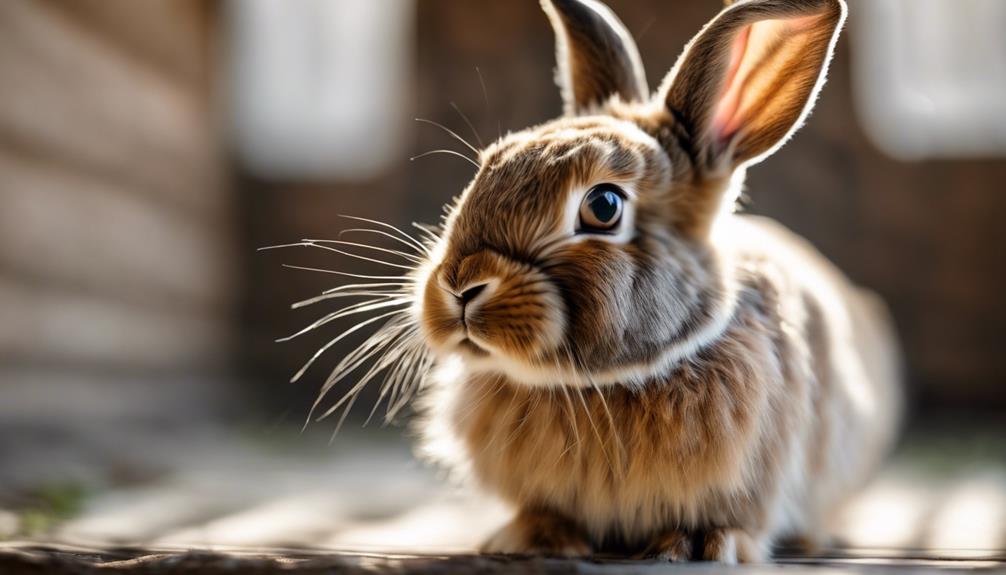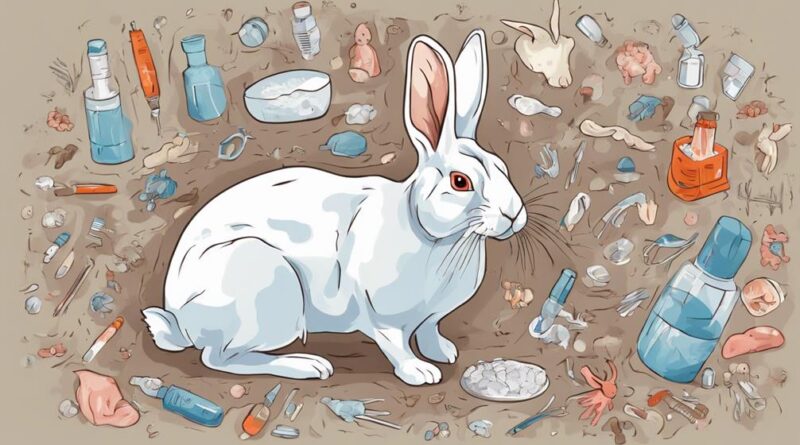Why Are These Diseases Common in Pet Rabbits?
You might wonder why some diseases seem to affect pet rabbits more frequently than other animals. It's essential to understand that rabbits have unique physiological characteristics that predispose them to certain health issues.
From dental problems to gastrointestinal stasis, respiratory issues, and skin conditions, these ailments can significantly impact your furry companion's well-being.
But, have you ever considered how their dietary needs might contribute to these prevalent diseases? Keep reading to uncover the surprising link between rabbits' diets and their susceptibility to common health concerns.
Dental Issues
Dental problems in rabbits can lead to serious health issues if not addressed promptly. Prevention measures are crucial to ensure your pet's dental health. Providing a diet high in fiber, such as hay and leafy greens, can help wear down their teeth naturally. Additionally, offering wooden chew toys can aid in preventing overgrowth of teeth, a common issue in rabbits. Regular veterinary check-ups are essential to catch any dental issues early on.
If your rabbit does develop dental problems, there are several treatment options available. One common issue is malocclusion, where the teeth don't align properly. Treatment for this may involve filing down the teeth to improve alignment. In severe cases, tooth extraction might be necessary. Pain management is also a key aspect of treatment for dental issues in rabbits. Your veterinarian may prescribe pain medication to keep your pet comfortable during the healing process.
Gastrointestinal Stasis
To maintain your pet rabbit's overall health, it's important to be aware of the dangers of gastrointestinal stasis. Gastrointestinal stasis, also known as ileus, is a common issue in rabbits where the normal movement of food and waste through the digestive system slows down or stops completely. This condition can be life-threatening if not addressed promptly.
Here are some key points to help prevent gastrointestinal stasis in your pet rabbit:
- Diet management: Ensure your rabbit's diet is high in fiber, primarily consisting of hay. Limit sugary treats and introduce fresh vegetables gradually to avoid upsetting their stomach.
- Prevention: Provide plenty of opportunities for exercise to keep the gut moving. Encourage natural behaviors like hopping and exploring to prevent the onset of stasis.
- Hydration: Make sure your rabbit has access to fresh water at all times. Dehydration can contribute to gastrointestinal issues, so monitor their water intake closely.
- Exercise recommendations: Regular exercise is crucial for preventing gastrointestinal stasis. Create a safe and spacious environment for your rabbit to move around freely and engage in physical activity.
- Vet check-ups: Schedule regular check-ups with a rabbit-savvy veterinarian to monitor your pet's overall health and catch any potential issues early on.
Respiratory Problems
Respiratory problems can pose a serious threat to your pet rabbit's health and well-being. These issues are often influenced by environmental factors such as poor ventilation, dusty bedding, or exposure to cigarette smoke. If you notice symptoms like sneezing, nasal discharge, or labored breathing, prompt veterinary care is crucial.
When it comes to treatment options for respiratory problems in rabbits, your vet may recommend antibiotics, nebulization therapy, or supportive care to help your furry friend recover. It's essential to follow your vet's instructions carefully and ensure your rabbit completes the full course of medication prescribed.
Prevention strategies play a key role in maintaining your rabbit's respiratory health. Keeping your rabbit's living area clean, well-ventilated, and free from irritants can help minimize the risk of respiratory issues. Regularly changing bedding, avoiding smoking near your rabbit, and providing a balanced diet can all contribute to a healthy respiratory system.
Raising awareness about respiratory health is vital for all rabbit owners. Educating yourself about common respiratory conditions, their symptoms, and the importance of timely intervention can make a significant difference in your pet's well-being. By staying vigilant and proactive, you can help your rabbit lead a happy and healthy life free from respiratory problems.
Skin Conditions
Maintaining your pet rabbit's skin health is crucial in ensuring their overall well-being and comfort. Skin conditions can cause discomfort and distress to your furry friend, so being proactive in preventing and treating them is essential.
Here are some key points to consider:
- Flea Infestations: Regularly check your rabbit for fleas, especially during warmer months. If your rabbit has fleas, consult your veterinarian for appropriate treatment options to eliminate the infestation.
- Allergies: Be mindful of potential allergens in your rabbit's environment, such as certain bedding materials or cleaning products. Prevent allergies by keeping their living area clean and using hypoallergenic products.
- Regular Grooming: Brush your rabbit's fur regularly to remove loose hair and prevent matting, which can lead to skin irritations.
- Balanced Diet: Ensure your rabbit's diet is nutritionally balanced to support healthy skin and coat. Consult with a veterinarian to determine the best diet for your rabbit's specific needs.
- Veterinary Check-ups: Schedule regular check-ups with a rabbit-savvy veterinarian to monitor your pet's skin health and address any concerns promptly.
E. Cuniculi Infection
Regularly monitor your pet rabbit for symptoms of E. Cuniculi infection to quickly detect and address any potential health concerns. E. Cuniculi is a parasitic disease caused by the microscopic parasite Encephalitozoon cuniculi. This infection can lead to severe health issues, especially affecting the kidneys, liver, and nervous system, causing neurological damage in rabbits.
Transmission of E. Cuniculi usually occurs through the ingestion of spores found in the urine of infected animals. Preventing the spread of this disease involves keeping your rabbit's living area clean and maintaining good hygiene practices. Additionally, avoiding contact with wild rabbits and minimizing exposure to potentially contaminated environments can help reduce the risk of infection.
If your rabbit shows symptoms of E. Cuniculi, such as head tilt, seizures, loss of coordination, or urinary incontinence, it's crucial to seek veterinary care promptly. Treatment for E. Cuniculi often involves medication to manage the symptoms and reduce the parasite load in the rabbit's body. Early detection and intervention can improve the outcome for rabbits affected by this infection.
Obesity and Overweight
To prevent health issues in your pet rabbit, be mindful of the risks associated with obesity and overweight. Rabbits, like humans, can suffer from obesity-related problems that can impact their overall well-being.
Here are some key points to consider:
- Exercise Requirements: Ensure your rabbit gets enough exercise to maintain a healthy weight. Encourage playtime and provide opportunities for movement within their living space.
- Dietary Needs: Offer a balanced diet rich in hay, fresh vegetables, and a limited amount of pellets. Avoid excessive treats and high-calorie foods.
- Preventive Measures: Monitor your rabbit's weight regularly and adjust their diet and exercise routine as needed. Consult with a veterinarian for guidance on maintaining a healthy weight.
- Treatment Options: If your rabbit is already overweight, work with a vet to develop a weight loss plan. This may involve dietary modifications and increased physical activity.
- Regular Check-ups: Schedule regular veterinary check-ups to monitor your rabbit's weight and overall health. Early detection of weight-related issues can help prevent complications down the line.
Pasteurellosis

Pasteurellosis, also known as 'snuffles,' is a common bacterial respiratory infection in pet rabbits. This disease is caused by the bacterium Pasteurella multocida and can present with symptoms such as nasal discharge, sneezing, difficulty breathing, and head tilt. Treatment options for Pasteurellosis typically involve antibiotics; however, it's important to note the rising concern of antibiotic resistance in these bacteria. Always consult a veterinarian to determine the most suitable antibiotic for your rabbit's specific case.
Transmission of Pasteurellosis can occur through direct contact with infected rabbits or contaminated environments. To prevent the spread of this disease, ensure proper hygiene practices, separate sick rabbits from healthy ones, and quarantine new rabbits before introducing them to your existing group. Additionally, maintaining good ventilation and a clean living environment can help reduce the risk of infection.
When dealing with Pasteurellosis, early detection and prompt treatment are crucial. Monitor your rabbit's behavior and respiratory health regularly, and seek veterinary care at the first sign of illness. By staying vigilant and implementing effective prevention strategies, you can help protect your pet rabbit from the impacts of Pasteurellosis.
Parasitic Infestations
Concerning your pet rabbit's health, another common issue to watch out for is parasitic infestations. Parasites can pose a significant threat to your bunny's well-being if left unchecked. Here are some key points to consider:
- Regular Vet Check-ups: Ensure your rabbit receives routine vet check-ups to detect and prevent parasitic infestations early.
- Clean Living Environment: Keep your rabbit's living area clean and dry to minimize the risk of parasites thriving.
- Proper Hygiene: Maintain good hygiene practices when handling your rabbit to reduce the chances of transmitting parasites.
- Parasite Prevention Products: Use veterinarian-recommended parasite prevention products to safeguard your bunny's health.
- Health Implications: Parasites such as mites, fleas, and worms can lead to various health issues in rabbits, including skin irritations, anemia, and digestive problems.
Preventative measures play a crucial role in protecting your pet rabbit from parasitic infestations. If your rabbit does get infested, swift action is essential. Consult your veterinarian for suitable treatment options tailored to your rabbit's specific needs. Remember, staying proactive and informed about parasite prevention can help keep your furry friend healthy and happy.
Frequently Asked Questions
Are There Any Specific Breeds of Rabbits That Are More Prone to Developing Dental Issues?
Certain breeds of rabbits, due to genetic predisposition, are more prone to developing dental issues. Factors like diet and dental care play a crucial role in maintaining their dental health.
Regular check-ups and providing appropriate chew toys can help prevent these problems. Be mindful of your rabbit's oral health, as some breeds may require extra attention in this area.
Can Certain Environmental Factors Contribute to the Development of Gastrointestinal Stasis in Pet Rabbits?
To prevent gastrointestinal stasis in your pet rabbit, focus on proper diet management and reducing stress factors. Ensure your rabbit gets enough exercise and maintain a suitable temperature. By providing a balanced diet and a stress-free environment, you can help prevent this condition.
Regular vet check-ups and a rabbit-savvy diet plan can also contribute to your pet's overall well-being.
How Can Pet Owners Prevent Respiratory Problems in Their Rabbits?
To prevent respiratory problems in your rabbits, focus on providing a well-ventilated living space and avoiding exposure to drafts. Keep their environment clean by regularly changing bedding and removing any potential irritants like dusty hay.
Additionally, ensure your rabbits have a balanced diet rich in hay, fresh vegetables, and clean water to support their overall health. Encourage exercise by allowing them space to hop around daily.
Are There Any Home Remedies That Can Help With Managing Skin Conditions in Rabbits?
To manage skin conditions in rabbits, try natural remedies like oatmeal baths or chamomile tea soaks. Dietary supplements rich in omega-3 fatty acids can improve skin health.
Regular veterinary care is crucial for diagnosing and treating skin issues. Proper grooming techniques, such as brushing and keeping the living environment clean, can prevent skin problems.
If skin conditions persist, seek professional veterinary advice for the best treatment options.
What Are the Long-Term Effects of E. Cuniculi Infection on a Pet Rabbit's Health?
If your pet rabbit gets infected with E. cuniculi, be aware of potential long-term effects. This parasite can cause neurological complications like head tilting or seizures. Behavioral changes such as aggression or lethargy may also occur.
Additionally, E. cuniculi can lead to kidney damage, resulting in urinary issues. Regular veterinary check-ups and prompt treatment are essential for managing these risks and ensuring your rabbit's health and well-being.
Conclusion
In conclusion, pet rabbits are prone to certain diseases due to a combination of genetic predispositions, poor diet, lack of exercise, and environmental factors.
By being aware of these common health issues and taking proactive measures such as providing a balanced diet, regular veterinary check-ups, and a clean living environment, pet owners can help prevent these diseases and ensure their rabbits live long and healthy lives.
